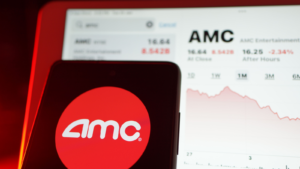
It’s crucial to steer clear of potential pitfalls that could sink your portfolio. With the S&P 500 and Nasdaq posting impressive year-to-date gains, it’s tempting to get caught up in the bullish fervor. However, beneath the surface, there are warning signs that shouldn’t be ignored.
In the near-term, the market’s resilience in the face of elevated interest rates and global economic weakness is noteworthy. Consumer spending and business investment remain strong, supporting a steady, if unspectacular, GDP growth forecast for the year. However, the picture becomes murkier when you look deeper into the stock market and realize that many businesses have been performing terribly and could likely see more pain over the next few quarters.
I believe selling these stocks is the only sensible action investors can consider right now.
GameSquare (GAME)

GameSquare (NASDAQ:GAME) is a Gen Z-oriented company that is focused on vertically integrated digital media. While that may look like an area with solid growth potential, the company has been faced with some significant headwinds. I believe that GameSquare doesn’t really get Gen Z and is still stuck in the past. For example, the company recently merged with FaZe, a dead gaming clan. FaZe was popular with Gen Z, but that was around a decade ago.
Importantly, GameSquare is still unprofitable. The company posted a net loss of $5.3 million in Q1 2024. Notably, this loss was $1 million higher than the prior year. Liquidity is also a concern, with GameSquare’s short-term obligations outweighing its liquid assets. Moreover, the stock could soon slide below Nasdaq’s listing requirements. The dilution here is already quite bad.
Additionally, GAME stock has been extremely volatile, with a 1-week price return of almost -12%. While revenues did increase significantly in Q1, the company’s widening losses and execution risks around the FaZe Clan merger integration make me very bearish about GameSquare’s prospects moving forward.
AMC Entertainment (AMC)

AMC Entertainment’s (NYSE:AMC) outlook seems pretty grim. The company is drowning in debt, and even with potential interest rate cuts on the horizon, I just don’t see how the company can compete with the streaming juggernauts over in the long-run. A recent article from my colleague Rich Duprey hit the nail on the head. Basically, AMC is at the mercy of Hollywood, which seems to have forgotten how to consistently churn out the blockbuster hits that put butts in theater seats.
He noted: “AMC stock should be avoided until Hollywood proves it can consistently produce movies audiences want to see.” Ouch.
Couple that with the fact that Gen Z overwhelmingly prefers to stay home and stream their entertainment, and AMC’s future looks bleak. S&P recently downgraded AMC’s credit rating even further into junk territory, which is another red flag. The stock price has been in free fall, down over 85% in the past year alone.
Personally, I think the only path to a happy ending for AMC is an acquisition by a bigger player. But with the mountain of debt on their balance sheet, who knows if anyone will want to take on that risk. As a movie lover, I’m rooting for the magic of the big screen to endure. However, I’d stay far away from AMC stock as an investor. The headwinds are just too strong.
Ginkgo Bioworks (DNA)

Ginkgo Bioworks (NYSE:DNA) has been facing significant headwinds lately, and I’m growing increasingly bearish on the company’s prospects. In Q1, Ginkgo’s revenue plummeted 53% year-over-year to $38 million, while net losses remained steep at $165.9 million. The top line missed estimates by nearly 17.6%.
With a dismal net margin of -437.25%, it’s hard to see how Ginkgo will ever turn a profit without gutting its already struggling top line. Analysts are taking note of these red flags, with BTIG slashing its price target to a mere 20 cents and maintaining a sell rating, while William Blair downgraded the stock to underperform.
Ginkgo also faces the looming threat of delisting from the NYSE if its stock price doesn’t recover soon. Sure, the company still has $840 million in cash, but at the company’s current burn rate, that provides only a short runway of viability. This stock has been in constant decline, and that seems only likely to continue.
I suspect Ginkgo will keep limping along until it’s forced to massively dilute shareholders, file for bankruptcy, or at least pivot to another vertical in the biotech field.
On the date of publication, Omor Ibne Ehsan did not hold (either directly or indirectly) any positions in the securities mentioned in this article. The opinions expressed in this article are those of the writer, subject to the InvestorPlace.com Publishing Guidelines.
On the date of publication, the responsible editor did not have (either directly or indirectly) any positions in the securities mentioned in this article.





